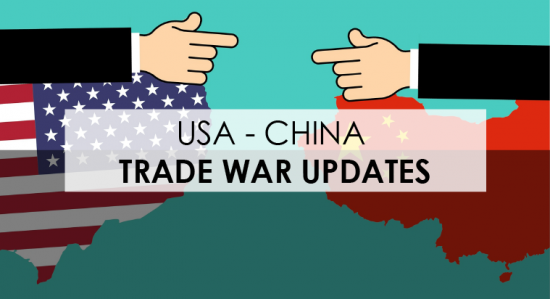The US-China Trade War rises to a whole new level as Trump announces tariff hikes on Chinese import goods. China’s Commerce Ministry ‘deeply regrets’ the way things have played out and warned that necessary countermeasures were of order, but did not care to comment any further. The transport industry has to expect to be greatly affected by this new geopolitical landscape shift.

A Bit of Context
Following US President Trump’s tweet rant over US-China trade negotiations, the Office of US Trade Representative (USTR) has issued a formal notice stating that the additional tariffs on over $200 billion worth of Chinese export goods (including food products, processed food, natural resources, chemicals, building materials, industrial products, electronics, transport, consumer goods, toiletries, clothing&textile and a few other unusual items, as reported by The Guardian) were to jump from 10% to 25% by May 10th. In addition to this, it would appear this new increase in tariffs could be extended to another $325 billion worth of import goods not already covered. The USTR also announced that a process through which interested persons could fill in requests to exempt specific products from this tariff jump was in the works, but has not released any further details on the matter.
This new shift of tides seemingly happened as a result of slowdowns in bilateral trade negotiations between the US and China due to China reportedly choosing to ‘retreat from specific commitments agreed to in earlier rounds’, which did not go down well with Trump’s administration. Furthermore, the White House also takes the opportunity to ‘resolve grievances such as intellectual property theft, forced technology transfers and trade deficits’, according to CNBC.
The Impact
The impact of this increase in tariffs is significant, and not in a good way by any means. The stock exchange takes the first blow, as usual: Dow Jones is down 400 points and Chinese CSI-300 Index is down over 3%. But then there is also the fact that American companies cannot avoid tariffs on China goods, meaning they still have to pay for them, despite the increase in terms of cost. On top of that, the non-augmented tariffs have cost the American Technology sector about $1 billion more since October (according to Reuters). Such figures already are so hard to deal with for smaller businesses that they wouldn’t survive should the tariffs get any higher. Moreover, it should be noted that it is not China who would pay the tariffs, but the American consumers and businesses, according to Consumer Technology Association CEO Gary Shapiro.
The Consequences
China’s Commerce Ministry expressed their ‘deepest regrets’ whilst also warning there would be countermeasures taken, but did not care to release any more details. In the meantime, the first negative consequences of Trump’s move did not originate from China, but from himself. In fact, ‘The Trade Partnership’ forecasts 29,000 job losses in Ohio and 32,000 in Pennsylvania (interestingly enough, both states voted for Trump in 2016), and that’s only in the immediate aftermath. Should there be any Chinese retaliation - which is inevitable - Baughman estimates over 2 million jobs lost in under 3 years time, country-wise.
According to Bloomberg Economics, tariffs at the current level add up to a 0.5 percentage-point drag on China’s GDP growth this year. An increase from 10% to 25% on over $200 billion worth of Chinese exports would raise the drag to 0.9 percentage point. Therefore, the burden on all of China’s exports to the U.S. would increase to 1.5 points.
And what of the Freight Forwarding Industry in all this ?
As for the freight forwarding industry, early 2019 already has revealed a decrease in volume. As things are now, it is too soon to accurately estimate the impact this new tariff will have on anything in the near future, especially since China is still yet to issue an official response. Nevertheless, some carriers already are ready to adapt their services. A clear example of this is Hong Kong’s Cathay Pacific CEO Rupert Hogg, who announced to be ready to cut capacity or cancel flights if US-China trade war hits cargo business (source: SCMP).
The transport industry has to expect to be greatly affected by this new geopolitical landscape shift, join our social media to follow our daily coverage via our shared news.
Bansard International is a global freight forwarder delivering transport, logistics, IT and Supply Chain. Based in 15 countries including China with 9 offices and USA with 7 offices. Our transport capabilities include air freight, sea freight, rail freight and international road. We deliver solutions worldwide.
SHARE THIS ARTICLE:



